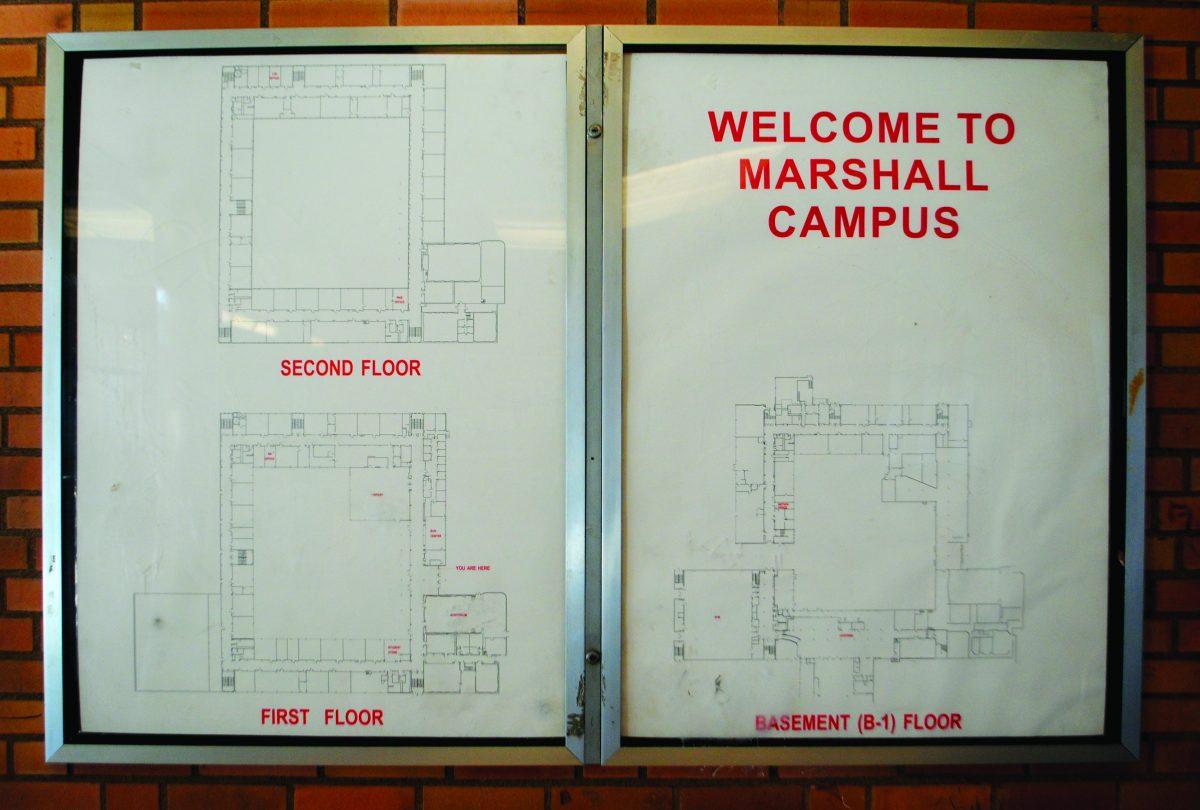Jack Deppa stands outside his classroom, pacing back and forth. It’s almost a daily ritual that he doesn’t make it into class until a few minutes after the late bell rings at 8:15 a.m. He won’t get marked tardy, though. It’s a habit the Grant sophomore’s teacher is trying to break.
Deppa, 15, puts away his coat and snack, then makes his way to his seat. Diagnosed with a moderate form of autism, he spends his school days in Room 132 learning the necessary basic life skills. Though reading, writing and math are part of his curriculum, the focus is on surviving in the real world.
Across the hall, junior Amelia Dale works on a task that wouldn’t be a problem for most of Grant’s student population. Her eyes watch a computer screen and she must press a button to keep the action on it going.
Dale, whose mental abilities are similar to those of a nine-month-old child, only comes to school three days a week. The rest of her time is spent at Providence Hospital’s Center for Medically Fragile Children, where she has lived since she was four months old.
Most students at Grant go to class, work toward a diploma and then go on to college or work. Some take a gap year. The day-to-day worries of tests, attendance and assignments may seem large. But to the kids in the Special Education department, they’d be nothing. Deppa and Dale are among dozens in the north wing’s Life Skills program, whose lives are drastically different from the rest of the school population.
Both Deppa and Dale have plans of graduating, something not as common among the Special Education community as in the rest of education. In Oregon, only 38 percent of students with disabilities got diplomas in the 2011-12 school year, according to statistics. Those numbers make Oregon one of the worst states in the country.
Portland Public Schools contributes to the problem by having only a 31 percent graduation rate among special education students, which is significantly less than surrounding districts such as Beaverton, with 48 percent.
Special education is a topic that isn’t discussed often, so many people don’t even know that there’s an issue. “Some students I work with now, 30 years ago, wouldn’t have been at Grant. They would have been in institutions,” says Megan Niemitz-Hull.
Amelia Dale was born in 1998 with no signs of a disorder. She spent the first fours months of her life at home, progressing like any other newborn. Living a mere 10 blocks away from Providence, Easterly and her then-partner, Jim Dale, never guessed it would be the place their daughter would spend her next 20 years.
At four months old, Dale began to have seizures, called infantile spasms, on a regular basis. “She’d shoot her arms straight out…her eyelashes would flutter and quiver and she’d scream,” remembers Easterly.
So, like any parent would, Easterly took her daughter to a pediatrician.
The doctor assured her everything was fine, but she knew it wasn’t. As a newly registered nurse, Easterly had a medical background and suspected trouble. After Dale underwent brain scans, Easterly and Jim Dale sat down with a neurologist to discuss their daughter’s condition. “It was the worst day of my life,” she says.
The doctor told the couple about lissencephaly.
A rare birth defect with symptoms much like cerebral palsy, it happens when chromosome 17 copies incorrectly, which likely occurred during Easterly’s first trimester of being pregnant with Dale. The outcome was a baby with a smooth brain.
The neurologist gave Dale’s parents a grim, worst-case scenario during the diagnosis, saying that she wouldn’t live past the age of two and would never be able to walk or talk.
Her parents moved her to the Center for Medically Fragile Children. The facility, with skilled nursing care around the clock, became her permanent home. Easterly went to see her daughter five to six days a week. Living so close made it easy to stay connected.
Dale’s dad went, too, but not quite as often. “It makes him sad,” says Easterly.
In first grade, Dale was transferred from a school for kids that needed extra help to a typical school: Lewis Elementary.
Easterly worried a lot about bullying before sending her child to Lewis. Easterly’s sister is blind and when the siblings were growing up, kids were cruel. Stealing her sister’s cane on the playground and teasing were daily activities, she remembers.
However, Easterly was pleased with the way things went for Dale socially. After fourth grade, she transferred to Kelly Elementary School, and later to Hosford Middle School.
In 2010, Dale’s family began to crumble. Easterly and James, who had been together 13 years, decided to split up.
Easterly moved to Vancouver soon after and remarried. She visits her daughter about three days a week, and stays for three or four hours. Her dad makes it when he can.
Amelia Dale loves sleeping in. Her caregivers don’t wake her up until 10 a.m. most days. Because of her disability, she only comes to Grant Mondays, Tuesdays, and Thursdays. The other time is spent at Providence doing activities with the staff and volunteers like Ron Enos.
Enos has been volunteering to spend time with Dale since she was 4 and has become an important figure in her life.
He met Amelia when she was having a bad day and scooped her up in his arms. She snuggled right in and completely relaxed – something she has only ever able to do with him. The two connected immediately.
Enos still visits Amelia once a week. “I will do this until I can’t do it,” he says. “I made Amelia a promise when she was 4 years old that I would always come back to see her…I just kind of see her as kind of an adopted daughter.”
Other days, Dale goes on field trips with other medically fragile kids and teens. She loves swimming, as well as other outings like visits to museums.
She is also part of a Girl Scout Troop that consists of about 30 girls at Providence and many from the outside community. Last year, she sold 250 boxes of Girl Scout cookies with her mom’s help, and part of the proceeds went toward the hospital.
Due to medication, her seizures have decreased to about four a week. They last for 10 seconds. For Easterly, it’s still incredibly hard to watch.
“She’s my life,” Easterly repeats several times. “She’s the love of my life.”
After her high school graduation, Dale will stay at Providence until age 21. Plans after that are uncertain. Easterly is considering moving her home and getting a nurse to help out or putting her in a home for medically fragile adults.
Deppa took a different route to Grant.
A hyperactive infant, Deppa never slowed down. He started walking at 11 months. Pretty soon after, he was running away. As soon as he could reach the doorknob, he was off, oftentimes in the middle of the night.
The Deppas live near Sauvie Island, surrounded by woods that made it especially dangerous. “I think a bear could have jumped out and growled at him and he would’ve been like, ‘OK,’” his mom recalls.
Deppa started losing vocabulary words, an indication of autism. Amy Deppa started noticing differences in her son’s behavior than what would be considered normal. She had never been around babies much, and didn’t know what to expect. She describes the next year as one of denial, common among parents with disabled children.
At his eighteen-month-old check up, she mentioned some of her son’s behaviors to his doctor. Much like Dale’s story, the doctor brushed it off, citing Deppa’s newborn younger brother, Nick Deppa, as the reason for Deppa’s acting a certain way.
However, as time progressed, Amy Deppa knew something was wrong. Her husband, John, accompanied her to an appointment when Deppa was 2. This time the parents insisted the pediatrician take a closer look, and after a quick test in her office, she agreed something was off.
Deppa was put on a six-month waiting list for an official diagnosis at the Oregon Health & Science University. His parents also enrolled their son in an early intervention program and different types of therapy.
Amy Deppa got up early with her son and headed to OHSU one day for hours of tests and meetings. Sure that her son had autism, the diagnosis was just a formality. But that didn’t stop the distress. “It’s almost like a loss. Even though you know it’s coming, it’s kind of like, it’s a very final thing,” she says now.
His mom admits she went through the stages of grief during the months that followed, rarely ever leaving the house.
The Deppas followed the doctor’s advice and continued occupational and speech therapy. They got some services through the state of Oregon and others with their insurance, but it still ended up being expensive.
When Deppa was 4, they met Clay Reiling through a therapy program in Beaverton.
Using a different kind of therapy than what is being done in schools today, Reiling focused on teaching Deppa people skills such as recognizing when someone is angry. Today, he pushes Deppa further than his mom thinks he can go, but the technique gets him to do more than anyone thought possible.
Skyline School is Deppa’s neighborhood elementary school. For his kindergarten year, Portland Public Schools implemented a new program and it became mandatory for students to be placed in mainstream classrooms with general education peers. Dale had a different experience because she is mentally fragile.
Amy Deppa knew it wouldn’t be the right fit for Deppa. She toured the school, then set up a meeting with the district’s head of Special Education. She and her husband got nowhere.
Kindergarten was a tough year for Jack Deppa. He screamed, created disturbances and didn’t fit in with the other students. Luckily for Deppa, according to his family, the head of Special Education left after that year and he was able to transfer to a school with a contained classroom.
His mother never thought Deppa would be able to ride a bike, but with annual summer trips to Sunriver, it was a skill that would reap many rewards. The parents heard about a program called Bike First! and thought they’d enroll Deppa.
For a week, he spent hours riding around in a gym. He started with large training wheels, gradually decreasing as he improved. Volunteers ran alongside him as Amy Deppa stood in awe at her son’s achievement.
By the third day, she saw how much progress he had made and bought a shiny red bike for him.
The first part of mornings in Niemitz-Hull’s classroom focus on each student’s independent routine. A few eat breakfast. Some, like Dale across the hall, watch a computer screen playing a song or reading a book. Another boy plays with fabric on his wheelchair.
Deppa has a checklist on his desk that he must follow. He picks up a piece of paper with his name and address before heading to a computers located on the north wall of the classroom, where he proceeds to copy the information into a Word document.
One of Niemitz-Hull’s goals for Deppa is for him to be able to complete the checklist by himself without any prompting.
Deppa is one of three students in his class that can speak, and one of four able to walk on their own.
In class, he’s learning about currency. He also works on reading comprehension in his individualized one-on-one and small group lessons.
Once a week, Reiling works with Deppa at his house. A typical therapy session lasts about three hours.
After school on Wednesdays, Amy Deppa drives her son to a therapeutic horse-riding program in Banks. When he arrives at the stables, Deppa is usually a little anxious, even though he has been riding horses for two years now.
When it’s time for the lesson, Deppa leads his horse to a corral where they walk and trot and practices leading the horse in patterns. He’s ridden in four horse shows, something he takes great pride in. Watch Jack Deppa ride Condo
His parents say they are taking things day by day. They want Deppa to become a productive member of society, possibly with some sort of job that suits his interests and abilities.
Students in the Intensive Skills classes haven’t been very involved with the rest of Grant since they began in 2010, something teachers would like to see change.
For the parents of these students, mixing in with Grant has been a positive experience. “I think basically by being able to get out and go to school she’s being able to learn how to integrate with other students her same age,” Easterly says of Amelia Dale’s time at the school. “If she weren’t to go to school, she wouldn’t be able to learn social interaction.” ◊












































